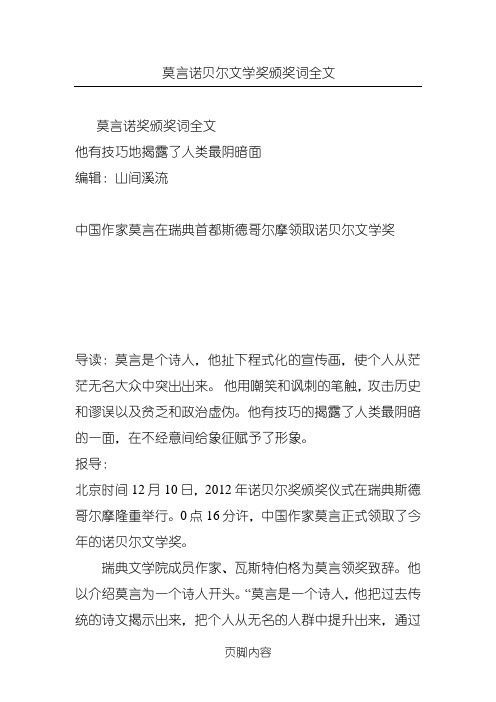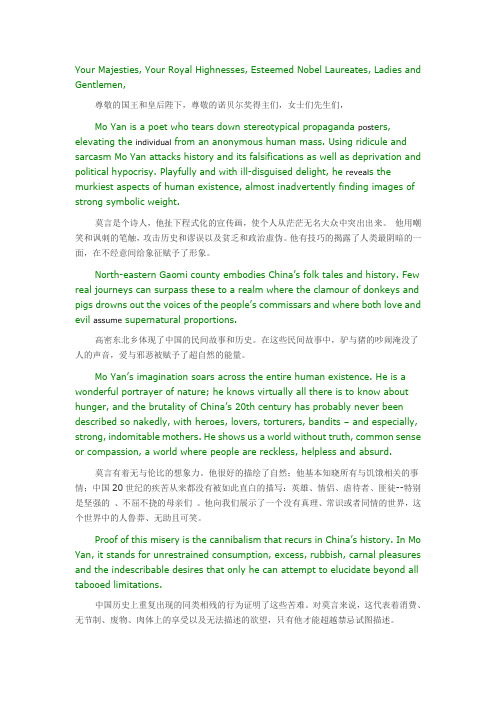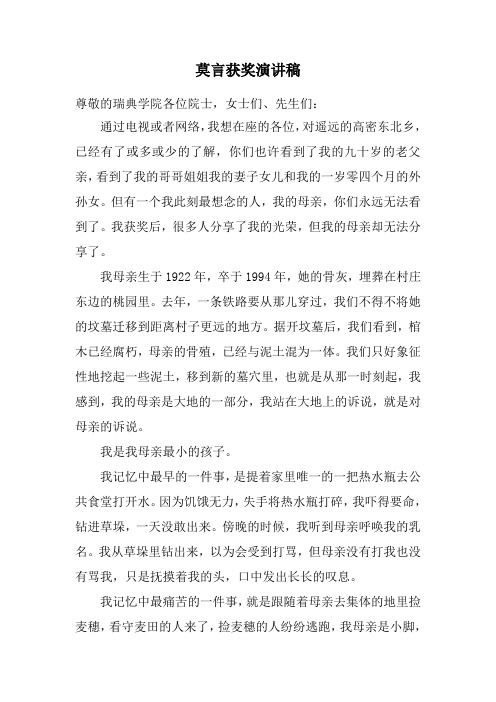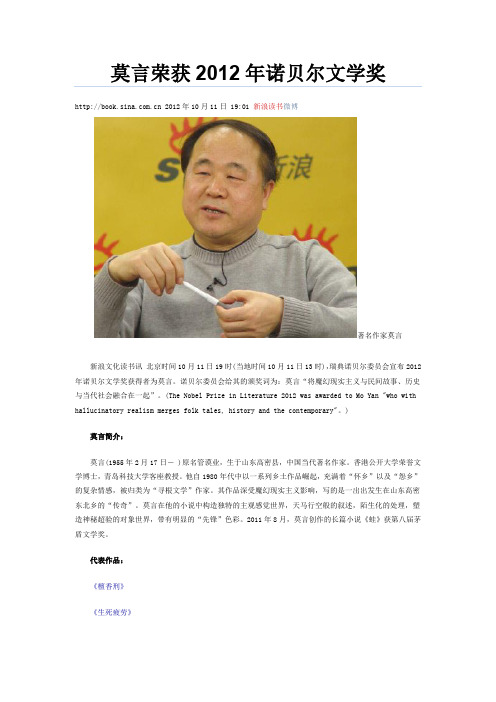2012年诺贝尔文学奖颁奖词(中英文,附莫言领奖照片)
莫言诺贝尔文学奖演讲(中英文对照)

莫言诺贝尔文学奖演讲北京时间2012年12月8日0时30分,诺贝尔文学奖获得者莫言在瑞典学院发表演讲,以下为演讲实录,英文由Howard Goldblatt翻译:尊敬的瑞典学院各位院士,女士们、先生们:Distinguished members of the Swedish Academy, Ladies and Gentlemen:通过电视或网络,我想在座的各位,对遥远的高密东北乡,已经有了或多或少的了解。
你们也许看到了我的九十岁的老父亲,看到了我的哥哥姐姐我的妻子女儿和我的一岁零四个月的外孙子,但是有一个此刻我最想念的人,我的母亲,你们永远无法看到了。
我获奖后,很多人分享了我的光荣,但我的母亲却无法分享了。
Through the mediums of television and the Internet, I imagine that everyone here has at least a nodding acquaintance with far-off Northeast Gaomi Township. You may have seen my ninety-year-old father, as well as my brothers, my sister, my wife and my daughter, even my granddaughter, now a year and four months old. But the person who is most on my mind at this moment, my mother, is someone you will never see. Many people have shared in the honor of winning this prize, everyone but her. 我母亲生于1922年,卒于1994年。
莫言诺贝尔文学奖颁奖词全文

莫言诺贝尔文学奖颁奖词全文莫言诺奖颁奖词全文他有技巧地揭露了人类最阴暗面编辑:山间溪流哥尔摩隆重举行。
0点16分许,中国作家莫言正式领取了今年的诺贝尔文学奖。
瑞典文学院成员作家、瓦斯特伯格为莫言领奖致辞。
他以介绍莫言为一个诗人开头。
“莫言是一个诗人,他把过去传统的诗文揭示出来,把个人从无名的人群中提升出来,通过一些讽刺主义的手法,莫言能够信奉历史,并且能够站在超脱于政治的层面之上,通过比较戏谑的方法和个体的愉悦揭示了人性体验、人性存在的各个方面,希望能够找到一种强势的、符号式的重量。
”基本知晓所有与饥饿相关的事情;中国20世纪的疾苦从来都没有被如此直白的描写:英雄、情侣、虐待者、匪徒--特别是坚强的、不屈不挠的母亲们。
他向我们展示了一个没有真理、常识或者同情的世界,这个世界中的人鲁莽、无助且可笑。
中国历史上重复出现的同类相残的行为证明了这些苦难。
对莫言来说,这代表着消费、无节制、废物、肉体上的享受以及无法描述的欲望,只有他才能超越禁忌试图描述。
莫言的故事有着神秘和寓意,让所有的价值观得到体现。
莫言的人物充满活力,他们甚至用不道德的办法和手段实现中,没有跳舞的独角兽和少女。
但是他描述的猪圈生活让我们觉得非常熟悉。
意识形态和改革有来有去,但是人类的自我和贪婪却一直存在。
所以莫言为所有的小人物打抱不平-从日本占领到毛泽东的错误到今天的疯狂生产。
在莫言的小说世界里,品德和残酷交战,对阅读者来说这是一种文学探险。
曾有如此的文学浪潮席卷了中国和世界么?莫言作品中的文学力度压过大多数当代作品。
瑞典文学院祝贺你。
请你从国王手中接过2012年诺贝尔文学奖。
莫言获得诺贝尔文学奖的颁奖词

Your Majesties, Your Royal Highnesses, Esteemed Nobel Laureates, Ladies and Gentlemen,尊敬的国王和皇后陛下,尊敬的诺贝尔奖得主们,女士们先生们,Mo Yan is a poet who tears down stereotypical propaganda post ers, elevating the individual from an anonymous human mass. Using ridicule and sarcasm Mo Yan attacks history and its falsifications as well as deprivation and political hypocrisy. Playfully and with ill-disguised delight, he reveal s the murkiest aspects of human existence, almost inadvertently finding images of strong symbolic weight.莫言是个诗人,他扯下程式化的宣传画,使个人从茫茫无名大众中突出出来。
他用嘲笑和讽刺的笔触,攻击历史和谬误以及贫乏和政治虚伪。
他有技巧的揭露了人类最阴暗的一面,在不经意间给象征赋予了形象。
North-eastern Gaomi county embodies China’s folk tales and history. Few real journeys can surpass these to a realm where the clamour of donkeys and p igs drowns out the voices of the people’s commissars and where both love and evil assume supernatural proportions.高密东北乡体现了中国的民间故事和历史。
莫言获奖演讲稿 (中英文版)

莫言获奖演讲稿尊敬的瑞典学院各位院士,女士们、先生们:通过电视或者网络,我想在座的各位,对遥远的高密东北乡,已经有了或多或少的了解,你们也许看到了我的九十岁的老父亲,看到了我的哥哥姐姐我的妻子女儿和我的一岁零四个月的外孙女。
但有一个我此刻最想念的人,我的母亲,你们永远无法看到了。
我获奖后,很多人分享了我的光荣,但我的母亲却无法分享了。
我母亲生于1922年,卒于1994年,她的骨灰,埋葬在村庄东边的桃园里。
去年,一条铁路要从那儿穿过,我们不得不将她的坟墓迁移到距离村子更远的地方。
据开坟墓后,我们看到,棺木已经腐朽,母亲的骨殖,已经与泥土混为一体。
我们只好象征性地挖起一些泥土,移到新的墓穴里,也就是从那一时刻起,我感到,我的母亲是大地的一部分,我站在大地上的诉说,就是对母亲的诉说。
我是我母亲最小的孩子。
我记忆中最早的一件事,是提着家里唯一的一把热水瓶去公共食堂打开水。
因为饥饿无力,失手将热水瓶打碎,我吓得要命,钻进草垛,一天没敢出来。
傍晚的时候,我听到母亲呼唤我的乳名。
我从草垛里钻出来,以为会受到打骂,但母亲没有打我也没有骂我,只是抚摸着我的头,口中发出长长的叹息。
我记忆中最痛苦的一件事,就是跟随着母亲去集体的地里捡麦穗,看守麦田的人来了,捡麦穗的人纷纷逃跑,我母亲是小脚,跑不快,被捉住,那个身材高大的看守人搧了她一个耳光。
她摇晃着身体跌倒在地。
看守人没收了我们捡到的麦穗,吹着口哨扬长而去。
我母亲嘴角流血,坐在地上,脸上那种绝望的神情让我终生难忘,多年之后,当那个看守麦田的人成为一个白发苍苍的老人,在集市上与我相逢,我冲上去想找他报仇,母亲拉住了我,平静地对我说:“儿子,那个打我的人,与这个老人,并不是一个人。
”我记得最深刻的一件事是一个中秋节的中午,我们家难得地包了一顿饺子,每人只有一碗。
正当我们吃饺子时,一个乞讨的老人,来到了我们家门口,我端起半碗红薯干打发他,他却愤愤不平地说:“我是一个老人,你们吃饺子,却让我吃红薯干,你们的心是怎么长的?”我气急败坏地说:“我们一年也吃不了几次饺子,一人一小碗,连半饱都吃不了!给你红薯干就不错了,你要就要,不要就滚!”母亲训斥了我,然后端起她那半碗饺子,倒进老人碗里。
121011 莫言荣获2012年诺贝尔文学奖,颁奖词祝贺词,主要作品简介

莫言荣获2012年诺贝尔文学奖 2012年10月11日 19:01 新浪读书微博著名作家莫言新浪文化读书讯北京时间10月11日19时(当地时间10月11日13时),瑞典诺贝尔委员会宣布2012年诺贝尔文学奖获得者为莫言。
诺贝尔委员会给其的颁奖词为:莫言“将魔幻现实主义与民间故事、历史与当代社会融合在一起”。
(The Nobel Prize in Literature 2012 was awarded to Mo Yan "who with hallucinatory realism merges folk tales, history and the contemporary"。
)莫言简介:莫言(1955年2月17日- )原名管谟业,生于山东高密县,中国当代著名作家。
香港公开大学荣誉文学博士,青岛科技大学客座教授。
他自1980年代中以一系列乡土作品崛起,充满着“怀乡”以及“怨乡”的复杂情感,被归类为“寻根文学”作家。
其作品深受魔幻现实主义影响,写的是一出出发生在山东高密东北乡的“传奇”。
莫言在他的小说中构造独特的主观感觉世界,天马行空般的叙述,陌生化的处理,塑造神秘超验的对象世界,带有明显的“先锋”色彩。
2011年8月,莫言创作的长篇小说《蛙》获第八届茅盾文学奖。
代表作品:《檀香刑》《生死疲劳》《红高粱家族》《透明的红萝卜》《战友重逢》《蛙》《藏宝图》《四十一炮》《天堂蒜薹之歌》《拇指铐》《白狗秋千架》《酒国》《白棉花》《红树林》《月光斩》《老枪·宝刀》《会唱歌的墙》《司令的女人》《良心作证》《锁孔里的房间》《什么气味最美好》《莫言心声系列丛书》《传奇莫言》《莫言中篇小说选》《莫言王尧对话录》《莫言精选集》《莫言作品精选》(编辑:仝清影)诺奖评委会:莫言令人联想福克纳和马尔克斯的融合 2012年10月11日 21:53 中国新闻网微博中新网10月11日电瑞典皇家科学院诺贝尔奖评审委员会11日宣布,中国作家莫言获得2012年诺贝尔文学奖。
2012年莫言获诺贝尔文学奖演讲词

2012年莫言获诺贝尔文学奖演讲词我说两句演讲稿之外的话,两个小时以前,我们瑞典学院的常务秘书,他的夫人生了一个小女孩,这是一个美丽的故事的开端,我相信在座的懂中文也懂外文的人,会把我刚才的话转译给大家,我向他表示热烈的祝贺。
我的演讲题目是《讲故事的人》。
尊敬的瑞典学院各位院士,女士们、先生们:通过电视或网络,我想在座的各位,对遥远的高密东北乡,已经有了或多或少的了解。
你们也许看到了我的九十岁的老父亲,看到了我的哥哥姐姐我的妻子女儿和我的一岁零四个月的外孙子,但是有一个此刻我最想念的人,我的母亲,你们永远无法看到了。
我获奖后,很多人分享了我的光荣,但我的母亲却无法分享了。
我母亲生于1922年,卒于1994年。
她的骨灰,埋葬在村庄东边的桃园里。
去年,一条铁路要从那儿穿过,我们不得不将她的坟墓迁移到距离村子更远的地方。
掘开坟墓后,我们看到,棺木已经腐朽,母亲的骨殖,已经与泥土混为一体。
我们只好象征性地挖起一些泥土,移到新的墓穴里。
也就是从那一时刻起,我感到,我的母亲是大地的一部分,我站在大地上的诉说,就是对母亲的诉说。
我是我母亲最小的孩子。
我记忆中最早的一件事,是提着家里唯一的一把热水壶去公共食堂打开水。
因为饥饿无力,失手将热水瓶打碎,我吓得要命,钻进草垛,一天没敢出来。
傍晚的时候我听到母亲呼唤我的乳名,我从草垛里钻出来,以为会受到打骂,但母亲没有打我也没有骂我,只是抚摸着我的头,口中发出长长的叹息。
我记忆中最痛苦的一件事,就是跟着母亲去集体的地理拣麦穗,看守麦田的人来了,拣麦穗的人纷纷逃跑,我母亲是小脚,跑不快,被捉住,那个身材高大的看守人煽了她一个耳光,她摇晃着身体跌倒在地,看守人没收了我们拣到的麦穗,吹着口哨扬长而去。
我母亲嘴角流血,坐在地上,脸上那种绝望的神情深我终生难忘。
多年之后,当那个看守麦田的人成为一个白发苍苍的老人,在集市上与我相逢,我冲上去想找他报仇,母亲拉住了我,平静的对我说:“儿子,那个打我的人,与这个老人,并不是一个人。
莫言诺贝尔奖颁奖典礼 中英文对照版
诺贝尔奖颁奖典礼上,文学委员会主席帕瓦斯特伯格介绍了莫言的作品,阐述了授予他诺贝尔文学奖的原因。
瓦斯特伯格的颁奖辞全文如下:Mo Yan is a poet who tears down stereotypical propaganda posters, elevating the individual from an anonymous human mass. Using ridicule and sarcasm Mo Yan attacks history and its falsifications as well as deprivation and political hypocrisy. Playfully and with ill-disguised delight, he reveals the murkiest aspects of human existence, almost inadvertently finding images of strong symbolic weight.莫言是一个撕下程序化宣传海报,将凡夫俗子一个个推上台面的诗人。
他以冷嘲热讽的笔致抨击历史及其作伪,以及剥夺的行为和政治伪装。
他戏谑地揭示了人生境遇中最阴暗的方面,漫不经心地摸索出极富象征力的形象。
North-eastern Gaomi county embodies China’s folk tales and history. Few real journeys can surpass these to a realm where the clamour of donkeys and pigs drowns out the voices of the people’s commissars and where both love and evil assume supernatural proportions.高密县东北乡体现了中国的民间故事和历史,不通过此类故事,你几乎很难脚踏实地地进入一个驴吼猪叫淹没了声音的国度,在那里,爱和恶的呈现已达到超自然的程度。
莫言诺奖授奖词全文
莫言诺奖授奖词全文导读:莫言是个诗人,他扯下程式化的宣传画,使个人从茫茫无名大众中突出出来。
他用嘲笑和讽刺的笔触,攻击历史和谬误以及贫乏和政治虚伪。
他有技巧的揭露了人类最阴暗的一面,在不经意间给象征赋予了形象。
报导:北京时间今日凌晨,2012年诺贝尔奖颁奖仪式在瑞典斯德哥尔摩隆重举行。
0点16分许,中国作家莫言正式领取了今年的诺贝尔文学奖。
瑞典文学院成员作家、瓦斯特伯格为莫言领奖致辞。
他以介绍莫言为一个诗人开头。
“莫言是一个诗人,他把过去传统的诗文揭示出来,把个人从无名的人群中提升出来,通过一些讽刺主义的手法,莫言能够信奉历史,并且能够站在超脱于政治的层面之上,通过比较戏谑的方法和个体的愉悦揭示了人性体验、人性存在的各个方面,希望能够找到一种强势的、符号式的重量。
”颁奖词全文如下:瑞典文学院诺奖委员会主席瓦斯特伯格:尊敬的国王和皇后陛下,尊敬的诺贝尔奖得主们,女士们先生们,莫言是个诗人,他扯下程式化的宣传画,使个人从茫茫无名大众中突出出来。
他用嘲笑和讽刺的笔触,攻击历史和谬误以及贫乏和政治虚伪。
他有技巧的揭露了人类最阴暗的一面,在不经意间给象征赋予了形象。
高密东北乡体现了中国的民间故事和历史。
在这些民间故事中,驴与猪的吵闹淹没了人的声音,爱与邪恶被赋予了超自然的能量。
莫言有着无与伦比的想象力。
他很好的描绘了自然;他基本知晓所有与饥饿相关的事情;中国20世纪的疾苦从来都没有被如此直白的描写:英雄、情侣、虐待者、匪徒--特别是坚强的、不屈不挠的母亲们。
他向我们展示了一个没有真理、常识或者同情的世界,这个世界中的人鲁莽、无助且可笑。
中国历史上重复出现的同类相残的行为证明了这些苦难。
对莫言来说,这代表着消费、无节制、废物、肉体上的享受以及无法描述的欲望,只有他才能超越禁忌试图描述。
莫言的故事有着神秘和寓意,让所有的价值观得到体现。
莫言的人物充满活力,他们甚至用不道德的办法和手段实现他们生活目标,打破命运和政治的牢笼。
2012年诺贝尔文学奖颁奖词(中英文,附莫言领奖照片)
莫言领奖莫言诺奖颁奖词(英文版)Award Ceremony SpeechPresentation Speech by Per Wästberg, Writer, Member of the Swedish Academy, Chairman ofthe Nobel Committee, 10 December 2012.Your Majesties, Your Royal Highnesses, Esteemed Nobel Laureates, Ladies and Gentlemen, Mo Yan is a poet who tears down stereotypical propaganda posters, elevating the individual froman anonymous human mass. Using ridicule and sarcasm Mo Yan attacks history and itsfalsifications as well as deprivation and political hypocrisy. Playfully and with ill-disguised delight, he reveals the murkiest aspects of human existence, almost inadvertently finding images of strong symbolic weight.North-eastern Gaomi county embodies China’s folk tales and history. Few real journeys cansurpass these to a realm where the clamour of donkeys and pigs drowns out the voices of the people’s commissars and where both love and evil assume supernatural proportions.Mo Yan’s imagination soars across the entire human existence. He is a wonderful portrayer o f nature; he knows virtually all there is to know about hunger, and the brutality of China’s 20th century has probably never been described so nakedly, with heroes, lovers, torturers, bandits –and especially, strong, indomitable mothers. He shows us a world without truth, common sense or compassion, a world where people are reckless, helpless and absurd.Proof of this misery is the cannibalism that recurs in China’s history. In Mo Yan, it stands for unrestrained consumption, excess, rubbish, carnal pleasures and the indescribable desires that only he can attempt to elucidate beyond all tabooed limitations.In his novel Republic of Wine, the most exquisite of delicacies is a roasted three-year-old. Boys have become exclusive foodstuff. The girls, neglected, survive. The irony is directed at China’s family policy, because of which female foetuses are aborted on an astronomic scale: girls aren’t even good enough to eat. Mo Yan has written an entire novel, Frog, about this.Mo Yan’s stories have mythical and allegorical pretensions and turn all values on their heads. We never meet that ideal citizen who was a standard feature in Mao’s China. Mo Yan’s characters bubble with vitality and take even the most amoral steps and measures to fulfil their lives and burst the cages they have been confined in by fate and politics.Instead of communism’s poster-happy history, Mo Yan describes a past that, with his exaggerations, parodies and derivations from myths and folk tales, is a convincing and scathing revision of fifty years of propaganda.In his most remarkable novel, Big Breasts and Wide Hips, where a female perspective dominates, Mo Yan describes the Great Leap Forward and the Great Famine of 1960 in stinging detail. He mocks the revolutionary pseudo-science that tried to inseminate sheep with rabbit sperm, all the while dismissing doubters as right-wing elements. The novel ends with the new capitalism of the ‘90s with fraudsters becoming rich on beauty products and trying to produce a Phoenix through cross-fertilisation.In Mo Yan, a forgotten peasant world arises, alive and well, before our eyes, sensually scented even in its most pungent vapours, startlingly merciless but tinged by joyful selflessness. Never a dull moment. The author knows everything and can describe everything – all kinds of handicraft, smithery, construction, ditch-digging, animal husbandry, the tricks of guerrilla bands. He seems to carry all human life on the tip of his pen.He is more hilarious and more appalling than most in the wake of Rabelais and Swift — in our time, in the wake of García Marquez. His spice blend is a peppery one. On his broad tapestry of China’s last hundred years, there are neither dancing unicorns nor skipping maidens. But he paints life in a pigsty in such a way that we feel we have been there far too long. Ideologies and reform movements may come and go but human egoism and greed remain. So Mo Yan defends small individuals against all injustices –from Japanese occupation to Maoist terror and today’s production frenzy.For those who venture to Mo Yan’s home district, where bountiful virtue battles the vilest cruelty,a staggering literary adventure awaits. Has ever such an epic spring flood engulfed China and the rest of the world? In Mo Yan’s work, world literature speaks with a voice that drowns out most contemporaries.The Swedish Academy congratulates you. I call on you to accept the 2012 Nobel Prize for Literature from the hand of His Majesty the King.颁奖词全文如下:(中文版)瑞典文学院诺奖委员会主席瓦斯特伯格:尊敬的国王和皇后陛下,尊敬的诺贝尔奖得主们,女士们先生们,莫言是个诗人,他扯下程式化的宣传画,使个人从茫茫无名大众中突出出来。
121011_莫言荣获2012年诺贝尔文学奖_颁奖词祝贺词_主要作品简介
莫言荣获2012年诺贝尔文学奖 2012年10月11日 19:01 新浪读书微博著名作家莫言新浪文化读书讯北京时间10月11日19时(当地时间10月11日13时),瑞典诺贝尔委员会宣布2012年诺贝尔文学奖获得者为莫言。
诺贝尔委员会给其的颁奖词为:莫言“将魔幻现实主义与民间故事、历史与当代社会融合在一起”。
(The Nobel Prize in Literature 2012 was awarded to Mo Yan "who with hallucinatory realism merges folk tales, history and the contemporary"。
)莫言简介:莫言(1955年2月17日- )原名管谟业,生于山东高密县,中国当代著名作家。
香港公开大学荣誉文学博士,青岛科技大学客座教授。
他自1980年代中以一系列乡土作品崛起,充满着“怀乡”以及“怨乡”的复杂情感,被归类为“寻根文学”作家。
其作品深受魔幻现实主义影响,写的是一出出发生在山东高密东北乡的“传奇”。
莫言在他的小说中构造独特的主观感觉世界,天马行空般的叙述,陌生化的处理,塑造神秘超验的对象世界,带有明显的“先锋”色彩。
2011年8月,莫言创作的长篇小说《蛙》获第八届茅盾文学奖。
代表作品:《檀香刑》《生死疲劳》《红高粱家族》《透明的红萝卜》《战友重逢》《蛙》《藏宝图》《四十一炮》《天堂蒜薹之歌》《拇指铐》《白狗秋千架》《酒国》《白棉花》《红树林》《月光斩》《老枪·宝刀》《会唱歌的墙》《司令的女人》《良心作证》《锁孔里的房间》《什么气味最美好》《莫言心声系列丛书》《传奇莫言》《莫言中篇小说选》《莫言王尧对话录》《莫言精选集》《莫言作品精选》(编辑:仝清影)诺奖评委会:莫言令人联想福克纳和马尔克斯的融合 2012年10月11日 21:53 中国新闻网微博中新网10月11日电瑞典皇家科学院诺贝尔奖评审委员会11日宣布,中国作家莫言获得2012年诺贝尔文学奖。
- 1、下载文档前请自行甄别文档内容的完整性,平台不提供额外的编辑、内容补充、找答案等附加服务。
- 2、"仅部分预览"的文档,不可在线预览部分如存在完整性等问题,可反馈申请退款(可完整预览的文档不适用该条件!)。
- 3、如文档侵犯您的权益,请联系客服反馈,我们会尽快为您处理(人工客服工作时间:9:00-18:30)。
莫言领奖莫言诺奖颁奖词(英文版)Award Ceremony SpeechPresentation Speech by Per Wästberg, Writer, Member of the Swedish Academy, Chairman ofthe Nobel Committee, 10 December 2012.Your Majesties, Your Royal Highnesses, Esteemed Nobel Laureates, Ladies and Gentlemen, Mo Yan is a poet who tears down stereotypical propaganda posters, elevating the individual froman anonymous human mass. Using ridicule and sarcasm Mo Yan attacks history and itsfalsifications as well as deprivation and political hypocrisy. Playfully and with ill-disguised delight, he reveals the murkiest aspects of human existence, almost inadvertently finding images of strong symbolic weight.North-eastern Gaomi county embodies China’s folk tales and history. Few real journeys cansurpass these to a realm where the clamour of donkeys and pigs drowns out the voices of the people’s commissars and where both love and evil assume supernatural proportions.Mo Yan’s imagination soars across the entire human existence. He is a wonderful portrayer o f nature; he knows virtually all there is to know about hunger, and the brutality of China’s 20th century has probably never been described so nakedly, with heroes, lovers, torturers, bandits –and especially, strong, indomitable mothers. He shows us a world without truth, common sense or compassion, a world where people are reckless, helpless and absurd.Proof of this misery is the cannibalism that recurs in China’s history. In Mo Yan, it stands for unrestrained consumption, excess, rubbish, carnal pleasures and the indescribable desires that only he can attempt to elucidate beyond all tabooed limitations.In his novel Republic of Wine, the most exquisite of delicacies is a roasted three-year-old. Boys have become exclusive foodstuff. The girls, neglected, survive. The irony is directed at China’s family policy, because of which female foetuses are aborted on an astronomic scale: girls aren’t even good enough to eat. Mo Yan has written an entire novel, Frog, about this.Mo Yan’s stories have mythical and allegorical pretensions and turn all values on their heads. We never meet that ideal citizen who was a standard feature in Mao’s China. Mo Yan’s characters bubble with vitality and take even the most amoral steps and measures to fulfil their lives and burst the cages they have been confined in by fate and politics.Instead of communism’s poster-happy history, Mo Yan describes a past that, with his exaggerations, parodies and derivations from myths and folk tales, is a convincing and scathing revision of fifty years of propaganda.In his most remarkable novel, Big Breasts and Wide Hips, where a female perspective dominates, Mo Yan describes the Great Leap Forward and the Great Famine of 1960 in stinging detail. He mocks the revolutionary pseudo-science that tried to inseminate sheep with rabbit sperm, all the while dismissing doubters as right-wing elements. The novel ends with the new capitalism of the ‘90s with fraudsters becoming rich on beauty products and trying to produce a Phoenix through cross-fertilisation.In Mo Yan, a forgotten peasant world arises, alive and well, before our eyes, sensually scented even in its most pungent vapours, startlingly merciless but tinged by joyful selflessness. Never a dull moment. The author knows everything and can describe everything – all kinds of handicraft, smithery, construction, ditch-digging, animal husbandry, the tricks of guerrilla bands. He seems to carry all human life on the tip of his pen.He is more hilarious and more appalling than most in the wake of Rabelais and Swift — in our time, in the wake of García Marquez. His spice blend is a peppery one. On his broad tapestry of China’s last hundred years, there are neither dancing unicorns nor skipping maidens. But he paints life in a pigsty in such a way that we feel we have been there far too long. Ideologies and reform movements may come and go but human egoism and greed remain. So Mo Yan defends small individuals against all injustices –from Japanese occupation to Maoist terror and today’s production frenzy.For those who venture to Mo Yan’s home district, where bountiful virtue battles the vilest cruelty,a staggering literary adventure awaits. Has ever such an epic spring flood engulfed China and the rest of the world? In Mo Yan’s work, world literature speaks with a voice that drowns out most contemporaries.The Swedish Academy congratulates you. I call on you to accept the 2012 Nobel Prize for Literature from the hand of His Majesty the King.颁奖词全文如下:(中文版)瑞典文学院诺奖委员会主席瓦斯特伯格:尊敬的国王和皇后陛下,尊敬的诺贝尔奖得主们,女士们先生们,莫言是个诗人,他扯下程式化的宣传画,使个人从茫茫无名大众中突出出来。
